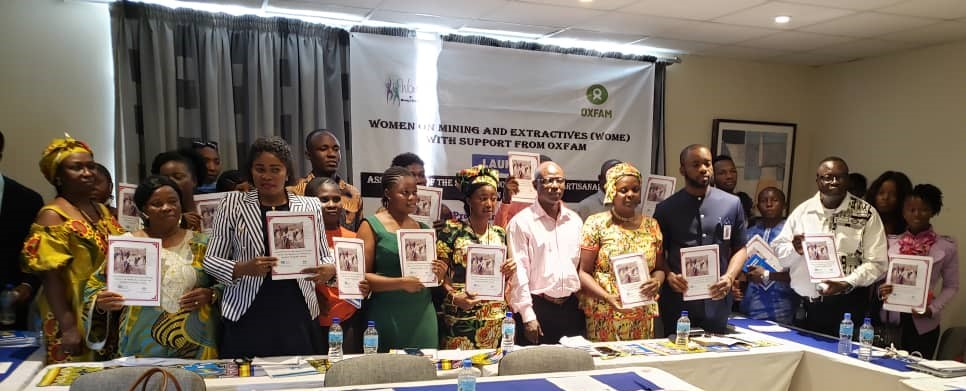By Anthony Vandy
FREETOWN, Nov. 9 (232News) – Women on Mining and Extractive (WoME) has launches assessment of the Socio Economic Impact of Artisanal Mining on Women in Sierra Leone promoting Women’s Livelihoods Through Artisanal Small-Scale Mining in Sierra Leone.
Artisanal and small-scale mining (ASM) is becoming more popular around the world. Women make up a considerable number of sector participants, with an estimated 40.5 million people actively involved in the activities and about 150 million people indirectly dependent on them.
While providing context, WoME Project Officer, Sahr Ansumana, said mining began in Sierra Leone in the 1990s, with artisanal mining playing a crucial role due to the low cost of the process and the lack of technological technology available at the time.
This attracted a large number of young people, including foreigners, to mining sites such as Tongo and Kono, resulting in the proliferation of illegal miners who profited at the expense of the government.
He argues that various research reveals that the natural resource curse has been studied since the 1950s, evaluating the paradox of many natural resource-rich countries struggling to develop economically and socially.
The research was carried out in Kono Kenama Tonkolili and Koinadugu, districts, respectively.
Despite the fact that there are no official numbers to establish the poverty level of the inhabitants in the district, approximately 63 percent of respondents believed mining had a negative influence on poverty, while the remaining 37 percent believed differently.
Because of the little income necessary, the data demonstrates that artisanal mining benefits women substantially in terms of sex distribution. According to the survey, 83 of the responders were women, accounting for 83 percent of the total. More than 65 percent of Sierra Leone’s working-age population, or nearly 2 million people, participate in the labor market.
He added that they are also confronted with traditional difficulties such as owning land as women and having mineral rights, as well as a strong culture, cultural norms, home discrimination, and a lack of education, which have relegated women to maintain involvement.
He concluded by stating that the lack of female participation in the important industry of mining gives men the power to wield financial control.
Children and moms who have been widowed and are still bearing children, as well as those who work in artisanal mining, are also included in the report.
After school, children travel to a mining site to help their family or parents.
He claims that 80 percent of students drop out of school on mining sites as a result of students staying in school to help their parents work.
The study examines the socioeconomic impact of artisanal mining on Sierra Leone’s women.
They claim that money is a major obstacle they must overcome.
Cedric Palmer is the National Mineral Agency’s (NMA) Artisanal Small Scale Compliance Manager.
According to him, the launch is oriented toward artisanal mining on a larger scale, which will result in a larger workforce and more job prospects for women.
He did say, however, that when it comes to decision-making and having a female representative, women are not involved.
He believes that women should play a significant role in decision-making.
He advocated for a fair playing field for men and women, as well as equal access to loans and financing.
He went on to say that while mining is a man’s job, women must be actively involved in all aspects of the industry’s operations and processes.
In some locations, women are not permitted to mine.
Beatrice Momodu-Kamara, Manager Compliance Extractive Industry Revenue at the National Revenue Authority, noted that while there is a gender disparity in educational attainment among the young, it is smaller than the comparable gap among older generations.
Young women have about 7 months less education than young men on average.
She claims that girls leave school at a younger age than boys, and that the high prevalence of teenage pregnancy is likely increasing this gender divide.
She claims that the need to begin working plays a significant influence, as young females begin working in about equal numbers after graduating from high school.
Finally, she stated that the small-scale mining sector is supposed to employ a large number of people in developing countries.
Madam Esther Kandeh, Director of Women on Mining and Extractive Industries, stated that mining is frequently linked to negative health effects on both miners and people living in and around mining areas. “Drilled pits in these settlements have contaminated surface and subsurface waters, posing major health concerns to the residents,” according to environmental protection officers.
She went on to say that during a focus group discussion in four areas, 85 percent of the participants claimed that mining carries health risks and that they would trade it for any dependable source of income.
Finally, they claimed that the relocated fertile topsoil is degraded or carried away, rendering the location unsuited for tree growth.
This, she claims, causes soil disturbance, making it harder to grow trees.

